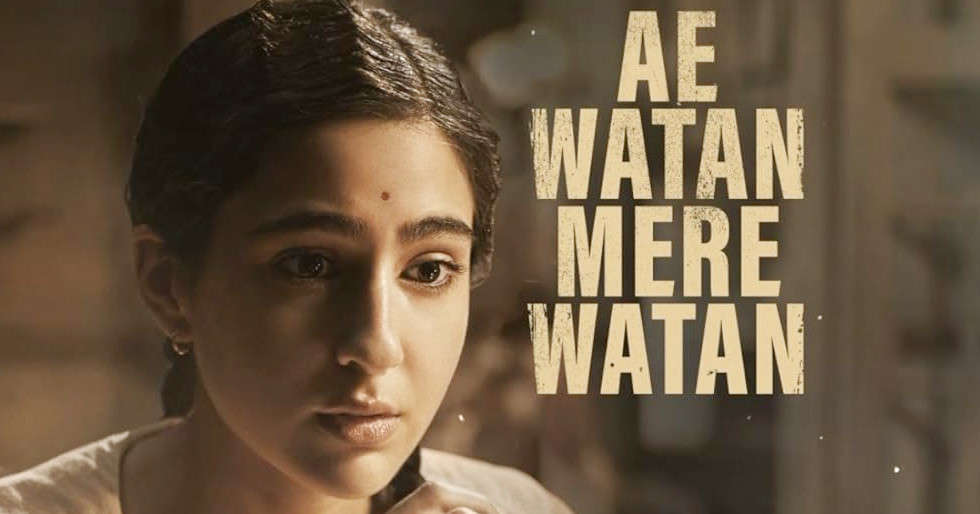
3.0/5
Ae Watan Mere Watan is based on the life of Usha Mehta, who was inspired by Mahatma Gandhi to join the freedom struggle. She took active part in the Quit India Movement in 1942. When most of the senior leaders of Congress were arrested, she helped run a secret Congress Radio for three months, keeping the spirit of the movement alive. Dr. Ram Manohar Lohia broadcasted his speeches from the radio and records of other leaders, like Gandhi, Nehru and Maulana Azad were also played on the radio. She was captured and tortured by the British and even sentenced to three years in jail. She had embraced celibacy at a young age and never got involved in active politics after India’s Independence. Later, she did doctoral studies in Gandhian philosophy and became a professor at her Wilson College. While she isn’t a luminary, she’s still counted as an important freedom fighter.
One would have loved to see the inner life of Usha Mehta being brought out in the film. It’s not clear why she was attracted towards Gandhiji and what led her towards celibacy. She’s shown to have rebelled against her father, who was a judge during the British era and is seen leaving home to fight against the British. But we’re not told how she survived on her own without any money or support. One has to keep in mind that during the 1940s, people were more conservative and it would have been really difficult for a single girl to survive on her own in Bombay. Her progression as an independent woman, free of societal norms, would have made an interesting study but the writers and the director chose to ignore that point. The internal struggles of the main, as well as ancillary characters are absent. Some scenes from the film remind you of a school play. There’s much enthusiasm in the proceedings but there’s also an absence of finesse. Sara Ali Khan’s confrontation scenes with her father, played by Sachin Khedekar, look like an acting exercise.
The film picks up upon the entry of Emraan Hashmi, who plays Ram Manohar Lohia. He plays Lohia with a certain nuance which is absent from the performance of others. You feel as if you’re actually watching a dedicated freedom fighter at work. He’s the best thing about the film and one can see that being free from the burden of playing the lead has done wonders for him. The film rests on the fragile shoulders of Sara Ali Khan and she doesn’t find it easy going. One can see she’s struggling to find a connection with the character she’s portraying. Her earnestness, her intensity can’t be denied however and she gamely ploughs on, despite the hurdles.
While it’s a laudable thing to make a film about lesser-known freedom fighters, more care should have been taken to round off the script. The production design and the VFX combine to give us old Bombay. Cinematography by Amalendu Chaudhary is also first rate. One of Usha Mehta’s nephews is director Ketan Mehta. We wonder why the noted filmmaker wasn’t approached to make a film on his aunt.
Watch Ae Watan Mere Watan to know a little more about a little-known chapter in India’s freedom struggle.
Trailer : Ae Watan Mere Watan
Abhishek Srivastava, March 21, 2024, 3:48 AM IST
3.0/5
Story: During the height of Mahatma Gandhi’s Quit India movement, a young girl takes on the challenge of uniting freedom fighters by initiating an underground radio station to bridge the communication gap.
Review: ‘Ae Watan Mere Watan’ sheds light on a lesser-known tale from India’s struggle for independence, a narrative that played a significant role in altering the trajectory of India’s quest for freedom following Mahatma Gandhi’s Quit India movement. This biographical drama engages audiences with its portrayal of the era, boasting rich art direction that vividly captures the mood of the country during that period. However, at its core, it leans more towards being a thriller, focusing on the protagonist’s endeavour to safeguard the underground radio station while evading capture by the British authorities. This premise promises several heart-pounding moments of thrill, yet the filmmakers fall short in fully capitalizing on this potential. Unfortunately, the film does not delve deeper into this thrilling aspect, leaving viewers longing for more exploration of its gripping elements.
The storyline of ‘Ae Watan Mere Watan’ is rooted in a true account, revolving around the courageous actions of Usha Mehta (Sara Ali Khan), who, at a tender age, embraced celibacy and dedicated herself to India’s struggle for independence. The film commences in 1930 Surat before transitioning to Mumbai in 1942, where Usha’s father attains the status of a judge in British India. A scene where her father showcases the car gifted by the Britishers reflects Usha’s evident disdain towards the British empire. Inspired by Mahatma Gandhi’s ideologies, Usha and her circle of friends pledge to contribute to the freedom movement by aligning themselves with the Congress. Upon their association with the Congress, they realize the existence of a communication gap among the freedom fighters, recognizing its urgency in hastening India’s liberation. With the assistance of Firdaus Engineer (Anand Tiwari), Usha establishes an underground radio station, bridging the divide among the freedom fighters. In her quest to aid India’s independence, she receives support from the likes of Ram Manohar Lohia (Emraan Hashmi). Upon the British authorities’ discovery of their plan, a high-stakes game of cat and mouse ensues.
Sara Ali Khan’s portrayal of Usha Mehta is sincere, but she barely scratches the surface. It’s a challenging character, given its historical significance in the freedom struggle. There are several intense scenes, particularly those featuring Usha’s interactions with Kaushik and her father, but none of them have turned out to be emotionally impactful. Sara’s performance in the film appears restrained, preventing them from fully blossoming. John Lyre (Alexx O’Nell), portrayed as the antagonist, is tasked with apprehending Usha and shutting down the radio station. However, his perpetually grumpy demeanour doesn’t add much depth to the character. Effective communication through body language and facial expressions is an art that not all actors are able to master. Two standout performances in the film come from Sparsh Srivastav as Fahad and Emraan Hashmi as Ram Manohar Lohia. Sparsh’s intense portrayal is convincing, while Emraan Hashmi’s portrayal of Ram Manohar Lohia adds to his already impressive versatility as an actor.
‘Ae Watan Mere Watan’ presents an engaging narrative, yet it falls short of reaching its full potential for thrill. The film evokes reminiscence of the recently streamed series ‘All the Lights We Cannot See,’ starring Mark Ruffalo, Hugh Laurie, and Aria Mia Loberti. Had the film captured the same level of excitement as the series, the viewing experience would have been greatly enhanced. This historical drama stays true to its portrayal, avoiding extra frills, but it could have done more.
Powered by Yes Mom Hosting






